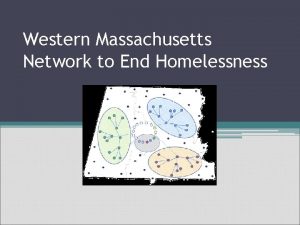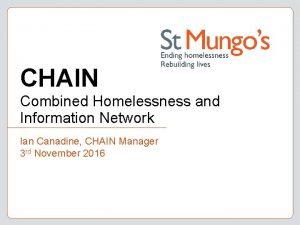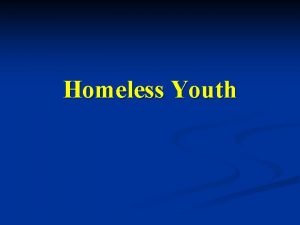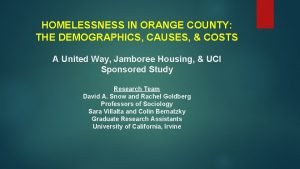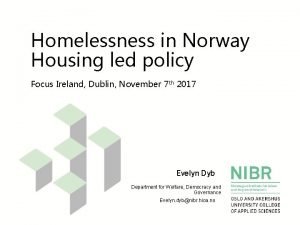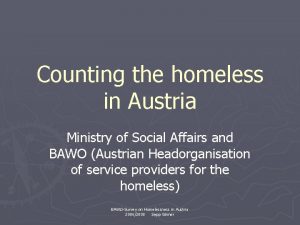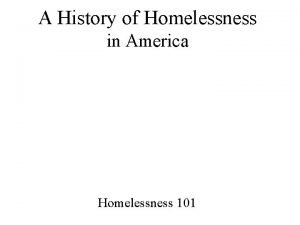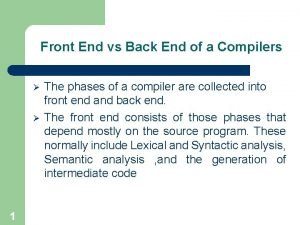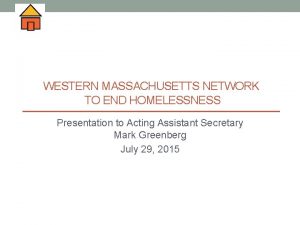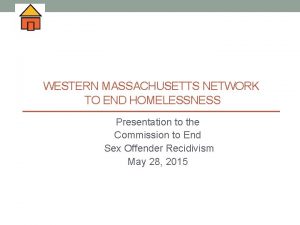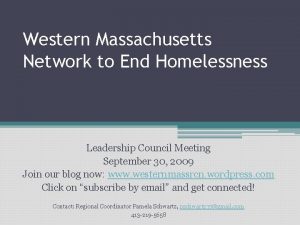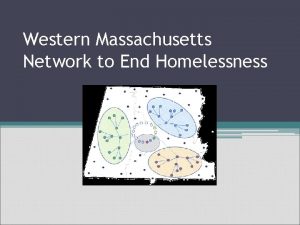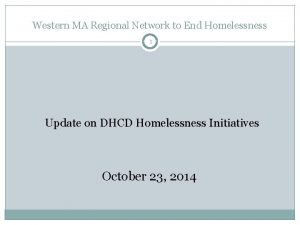WESTERN MASSACHUSETTS NETWORK TO END HOMELESSNESS Presentation to


















- Slides: 18

WESTERN MASSACHUSETTS NETWORK TO END HOMELESSNESS Presentation to the Commission to End Sex Offender Recidivism May 28, 2015

Our mission launched in 2009: The Network creates collaborative solutions to end homelessness through a housing first approach that prioritizes prevention, rapid re-housing and housing stabilization. Serving all four Western counties, including Hampden, Hampshire, Franklin and Berkshire, from Springfield to Pittsfield and dozens of rural communities in between.

Why we are here today The story of John: • A 14 year old ward of DSS when convicted of sexual relations with 12 year old. • At age 29, convicted of larcenies, drug possession and failure to register. • Level 3 classification by SORB followed these other convictions. • Served 4 years, 3 months; participated in extensive treatment while in jail; placed on lifetime parole supervision. • 33 years old, had not re-offended sexually since age 14. • Upon release in 2013, due to Level 3 status and lifetime parole, banned from living with his close friend in Springfield because he has a 16 year old daughter (despite having lived with them off and on since the children in the house were 3 and 7 years old). • Forced to relocate 40 minutes from all familiar support services and relationships; unable to participate in Springfield’s After Incarceration Support Services. • New charges pending of Failure to Register (3/24/15) and a Larceny Over $250 (1/12/15).

Our Network Partners Over 200 participating partners, including: • Senate President Stan Rosenberg, Senator Ben Downing, Representative Peter Kocot and Representative Aaron Vega; • 7 Western MA mayors and town managers • Faith leaders • Bank and other business leaders • Community college presidents and staff • Regional employment boards and career centers • Housing, child care, and health care providers

Our Structure • Leadership Council: Advisory Board of 60 Leaders • Family Services Committee • Individual Services Committee • Work Group to House People with Sex Offense Histories • Secure Jobs Advisory Committee (jobs program for homeless families) • Unaccompanied Homeless Youth Committee • Veterans Committee

Work Group to House People with Sex Offense Histories • Created in 2011, in direct response to increasing homelessness among sex offenders due to lack of housing options Mission: To maximize the safety of children, women and vulnerable others by minimizing the potential for re-offense through the identification and development of stable housing options for registered sex offenders who are committed to a positive and offense-free life

Housing Sex Offenders Work Group Members Include: • Hampden, Hampshire, Franklin and Berkshire Sheriff Departments • Springfield and Northampton Police Departments • Faith organizations across region, including churches, the Catholic Diocese and synagogues • Mental health and substance abuse treatment centers • Cooley Dickinson Hospital and Mercy Medical Center • Housing and elder home care agencies

Why we are here today • The story of Adam: • Now at age 73, suffers from Parkinsons Disease, COPD, diabetes, dementia, chronic kidney disease. Requires extensive assistance with all activities of daily living. • Released from prison in 2007, following conviction for sexual relationship with 14 year old neighbor. Deemed level 3. • Upon release, deposited by corrections officers at Friends of the Homeless shelter in Springfield without medications. Eventually transferred to a rest home but asked to leave due to Level 3 status. Now shares a group home and pays $1224 monthly; unable to pay other expenses. • Condition has worsened markedly; relies on a walker to ambulate and cannot use utensils due to his tremors. • Adam has not engaged in any criminal activity since his release in 2007 and was released from probation requirements this past December. • His level 3 status prohibits him from living in an elder subsidized complex and from becoming a resident of a skilled nursing facility. Between May 2014 and May 2015, Adam was admitted to the hospital 9 times and had 4 emergency room visits. • Attempted to have him re-leveled in 2013; case transferred to Boston; still pending due to “backlog at SORB. ” Does not have intellectual capacity to represent himself; SORB does not provide counsel for indigent clients.

Current Law • Federal public housing: Mandatory Any offender who is subject to lifetime sex offender registration in the state in which he resides is ineligible for admission to federal public housing 42 U. S. C. S. Section 13663 • State public housing: Discretionary Disqualified if the “applicant or the household member in the past has engaged in other criminal activity…which if repeated…would interfere with or threaten the rights of other tenants to be secure in their persons or their property or with the rights of other tenants to their peaceful enjoyment…” G. L. C. 121 B Section 32

Promoting Public Safety Through Housing The fear and concern for public safety make sense. Current practices and policies regarding housing and employment restrictions do not. Instead, they inadvertently increase the risk of harm to the public. “…Sex offenders without positive social support systems and stable employment recidivate at higher rates than those with jobs or ties to the community. ” (Levenson, 2008)

Destabilizing Factors Homelessness among sex offenders causes destabilization that can increase the risk for re-offense: • Increases lifestyle instability and transience • Fosters isolation and pushes sex offenders away from: • Social services and supports • Employment • Public Transportation • Increases risk of substance abuse and criminal associations • Creates seemingly insurmountable barriers to successful community re-integration

Best Practices A increasing number of national and local models exist that meet the complex problem of housing sex offenders in the community while maximizing public safety. Here in Massachusetts: • St Francis House, Boston • The Majestic Apartment Building, Springfield: Managed for 38 years by Rosa with support from probation, law enforcement and community service providers; 42 housing units, over 25 tenants are sex offenders; tenant behavior is excellent and only 1 tenant may have reoffended in 38 years.

Our Work Group’s Goals • Bring to the forefront evidence-based, best practices in housing sex offenders and provide education and training to the broader community; • Develop criteria to assist local housing providers in determining suitable housing for sex offenders; • Engage and train local housing providers on best practices regarding public safety and housing sex offenders; • Change housing provider policy from a blanket ban to case-by-case determinations regarding sex offenders.

Proposed Criteria for Housing Sex Offenders Available only to single adults seeking individual (non-family) housing: • On probation or parole • Attached to services such as sex offend-specific treatment, mental health and/or substance abuse treatment as deemed necessary • Designated community or agency contact person for communications regarding tenancy • Committed to living an offense-free life

Housing Providers Responded • 5 major housing providers in Western MA attended 3 meetings that included training by Dr. Laurie Guidry, success stories (Fred Smith of St. Francis House), review of the proposed criteria and intensive discussion. • Consensus: Until state policy changes and reflects evidence- based practices, housing providers do not feel they are sufficiently supported by the State to house sex offenders. The fear of liability outweighs understanding of current evidence and best practices. They need the State to provide leadership before they consider changing their policy of a complete ban.

Proposed Action Steps • Create Advisory Board to propose policy change that reflects evidence-based, best practices around the leveling system • Advance the dialogue and education regarding public safety in relationship to housing and employment practices for sex offenders: Housed and Employed Equals a Safer Community • Review and reform state housing policies to move away from absolute ban and implement case-by-case decision making based on evidence-based criteria

Why we are here today The story of Daniel: • At 15 years old, became homeless. Father convicted of a sex offense and sentenced to 30 years. Mother unable to care for him. • Survived living on the streets and selling drugs. • At 18 years old, charged with rape of a child. Deemed Level 3. • Released in 2012. Nowhere to go but in and out of shelters. . Family members and friends refused to take him in because of the random police checks that occur (invasive and threatening). Has to pay “extra” to landlord/acquaintance to be permitted to live anywhere due to “extra hassles” of housing a sex offender. • Returned to jail again in 2013 because “selling drugs felt like the only thing to do to support” himself. Also charged with failing to register as a sex offender (found it especially difficult to do since homelessness required registering every 30 days). • Will be released in 2 years (2017). Turned himself around in jail this time, attending school for GED and pursuing a job within the jail to learn what it is to have a “real job. ” • Daniel does not want to return to crime ever again but is very worried about the impact of his Level 3 status on being able to find a home or a job. “I don't want to get out and be forced to go back to the streets [to sell drugs] so I can afford to pay for a place to live. ”

For Further Information Contact: Pamela Schwartz, Director Western Massachusetts Network to End Homelessness 413 -219 -5658 pschwartz 77@gmail. com http: //westernmasshousingfirst. org
 Western mass network to end homelessness
Western mass network to end homelessness Michigan campaign to end homelessness
Michigan campaign to end homelessness Combined homelessness and information network
Combined homelessness and information network Finland homelessness solution
Finland homelessness solution Homelessness
Homelessness Youth homelessness definition
Youth homelessness definition Abolish homelessness
Abolish homelessness Causes of homelessness orange county
Causes of homelessness orange county Homelessness in norway
Homelessness in norway Homeless in austria
Homeless in austria Timeline of homelessness in america
Timeline of homelessness in america Definition of youth homelessness
Definition of youth homelessness The bill homelessness was
The bill homelessness was Triangle consulting social enterprise ltd
Triangle consulting social enterprise ltd Homelessness prevention team bristol
Homelessness prevention team bristol Mean stroke volume
Mean stroke volume End diastolic volume meaning
End diastolic volume meaning Front end of a compiler
Front end of a compiler Difference between front end and back end of compiler
Difference between front end and back end of compiler
